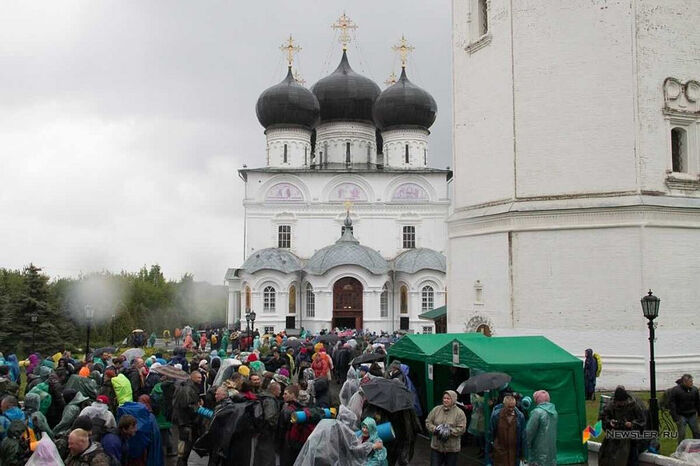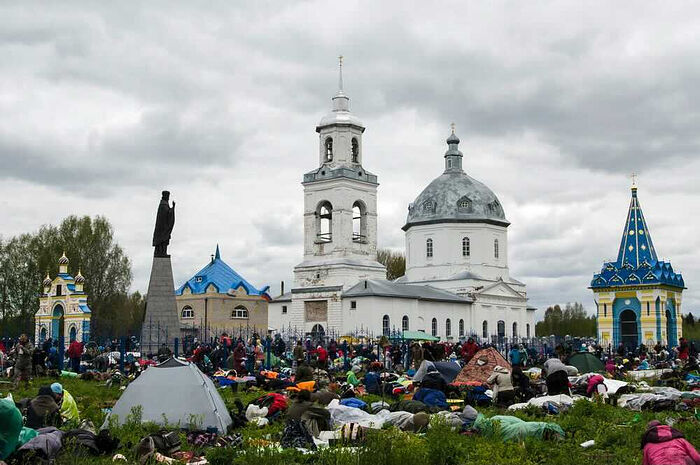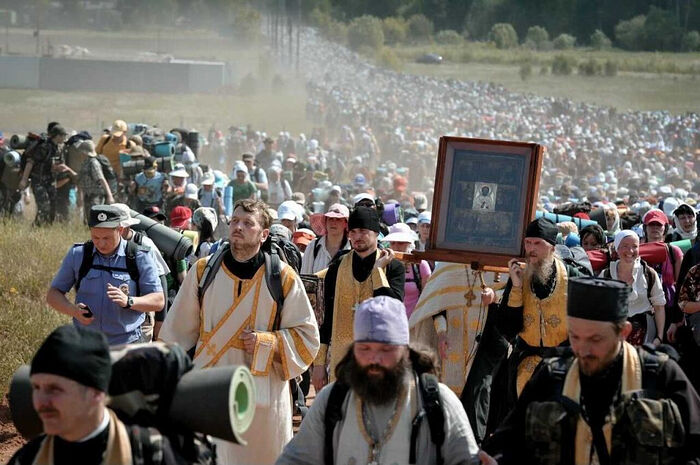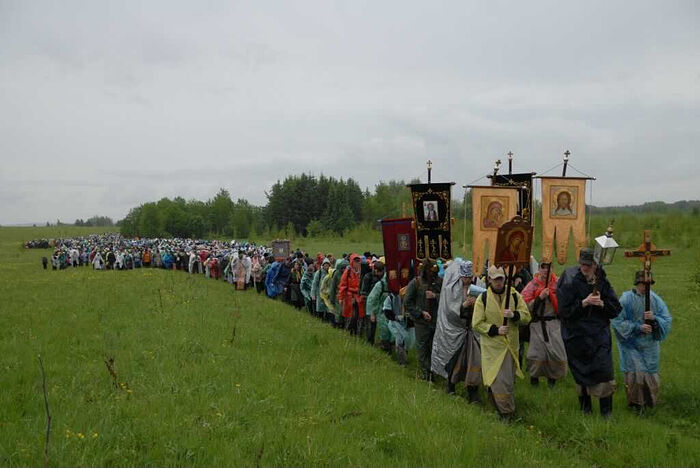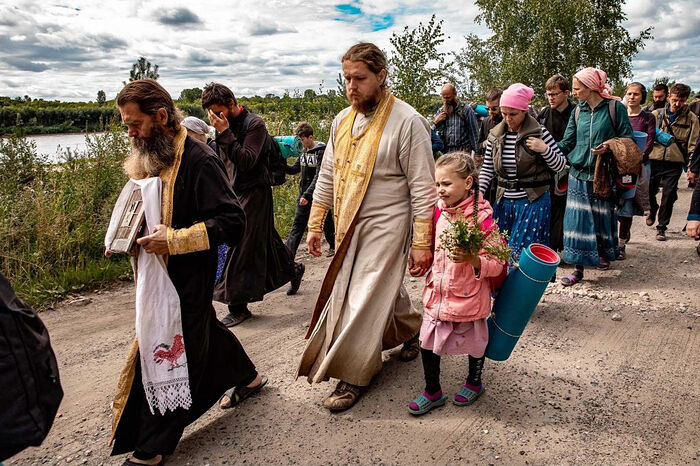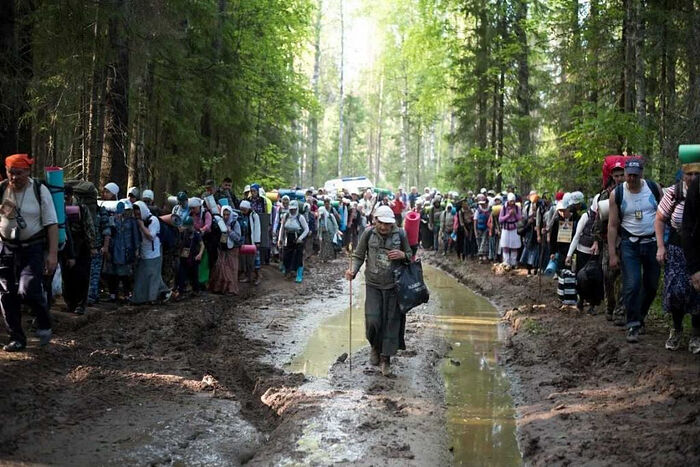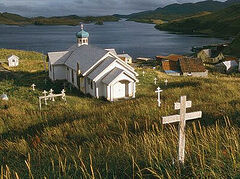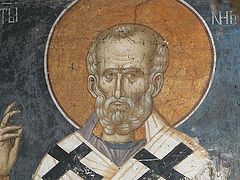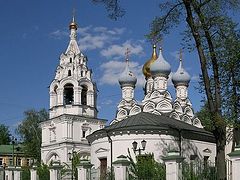The Velikoretsky Procession of the cross, with its 600-year-long history, the longest and the most renowned in today’s Russia, has held the status of an All-Russian Procession since 2000. For five days, the pilgrims walk a total of 150 kilometers across the Vyatka region, which is a little less than ninety kilometers from Kirov (formerly known as Vyatka and also as Khlynov) towards the Velikoretsky village in the Yuriansky District of Kirov Region, and then about sixty kilometers back. They walk along the traditional route carrying at the front of the procession the Velikoretsky icon of St. Nicholas of Myra in Lycia that appeared in this area, stopping at the ancient villages and settlements or what little has remained of them, thus fulfilling the promise of their ancestors—or aspiring to make their own.
June 3, 2021. I am standing on the Cathedral Square of the Holy Dormition St. Triphon monastery. The skies are clear but it’s chilly, the wind is piercing, and the swifts are flying above the domes; but the swifts are always there above the St. Triphon’s monastery, in all weather! The clergymen carry the Velikoretsky icon of St. Nicholas out of the gates. This year, the number of pilgrims was half as many compared to the previous years, so everyone was able to venerate the icon and take water from the holy spring to use while on the road. Still, there about twenty thousand of us here. The people inadvertently bump into one another’s backpacks and, accompanied by the Paschal pealing of bells, approach the monastery gates. Once there, everyone is blessed for happy travels with a sprinkling of the holy water. It is one of the most joyful moments in the procession. I am shivering from cold, yet my heart is feverishly pulsating at the exciting news: We are walking! After the confusion of last year when it was announced that only the diocesan clergy would walk in the procession (How’s that? I thought. St. Nicholas will look around and, with me nowhere in sight… what would he think!), but, after a moment of uncertainty as we waited in suspense, the news came that the procession will go on as usual‚—and here we are, on the road again!
We are walking along the main thoroughfare in Kirov. Our seers-off among the locals, although not a part of the procession, are with us in spirit—they stand on the roadside waving, blessing, and taking photos. We see the women tearing up and the young people smiling. Some smart fellas are crying out the Paschal greetings at the top of their lungs, and we happily respond. Christ is Risen! By the way, the lay people aren't quite allowed to say, “Christ is Risen!” as it’s reserved for the clergy. But some don’t quite follow the rule and it’s tempting at times to bend it a bit, crying out in response, “Truly He is Risen!” Because: it’s Pascha! And we are walking! And every church on our way greets and sees St. Nicholas off, with us in tow, by the paschal pealing of its bells.
The procession makes its first pit stop beside the Trinity Church on the outskirts of Kirov (the Makarye settlement). It’s sunny and warm. It feels wonderful to unroll the sleeping pad and stretch the legs. The white doves are circling high above the Trinity Church.
The Bobino village. Our first overnight stop. The majority of the procession participants called it a night and went off to their tents—we have to be up early (it’s practically nighttime in Moscow standards because our schedule calls for the icon to leave at 3 am, preceded by a 2 am prayer service to St. Nicholas). The pilgrims are still standing in line waiting to venerate the holy icon placed next to a wooden church (it has replaced an old stone church from the beginning of the eighteenth century destroyed by our predecessors of modern times), and a few women are singing the akathist. I join others at the back of the queue and try to sing along. It isn’t easy. I am way too sleepy. The first and the most difficult day is over. We walked for 20 kilometers (still a lot more lay ahead). But what a joy it is to realize that we have arrived! A flock of jackdaws is flying above the wooden dome, and the nightingales are serenading in the bushes near our improvised campsite.
I see an elderly priest sitting at a stool next to the church entrance; I approach him to receive a blessing. Someone has time to whisper that he is one of the “old-timers” in the procession: Very Rev. Fr. Vladimir Vasilyevykh, a local priest from Vyatka. He was a pediatric surgeon in his youth, then a priest, and also a dean of the town of Kiknur in the Vyatka Diocese. Nowadays, he is retired due to poor health but keeps himself busy by writing books, both prose and poetry. I ask for his blessing and venture to ask about his book. Fr. Vladimir doesn’t have any with him, but he promises to get me one later. Sure enough, it never crossed my mind that I should have asked for his telephone number. It would have sounded quite odd under these circumstances. The connection is patchy in this remote area. Besides, it’s St. Nicholas who runs the show here in the Velikoretsky Procession. It’s practically useless to arrange to meet someone at a particular time and a given location. If someone needs to meet, they will.
June 4. The morning is cruelly cold: the tent is soaking wet from the dew, it’s pure torture to climb out of the sleeping bag, to switch a woolen hat for a scarf, and then go through the agony of brushing teeth in the icy water. On the other hand, it’s our lucky day: No rain, and the skies are clear. It’s also bright outside, as it’s almost like white nights here. The sound of a church bell bids us farewell. As we are about to leave the village, we have to cross the stream and, when we go up the bridge… the bright blinding ball of the sun jumps in front of our eyes, the blue circles running along its surface. “It’s twirling around!”—confirm those in the know. I am not sure what this condition is called but the feeling of joy flares up in sync with the rising sun. I squint and keep walking while the sun is now softly and steadily sloshing around in my heart.
We enter an abandoned village, suddenly enveloped in the lilac cloud: the thick intoxicating aroma emanates from the blooming lilac bushes. I am reduced to one big smelling machine, so I close my eyes and float along the sea of lilac perfume… until I stumble upon someone’s monstrous backpack. I am tempted to break off a blooming branch but stop myself from doing it and absorb its beauty as a keepsake memory to treasure along my way.
The children are a great delight for the eyes during the procession of the cross. There are a lot of them from all age groups. For some reason, there’s not a single fussy kid among them—could it be that the parents have left the fussy ones at home? The youngest ones ride peacefully in their strollers, the preschoolers skip over the hillocks carrying rather bulky backpacks, while the older kids, particularly from the large families, act as the frontline support for the adults. They calmly walk on or assist at pushing the strollers, and so on. It’s when they reach the campsite they suddenly remember that they are just kids and so they buzz around making up for the time lost during the procession, showing no fatigue and having the energy of an energizer bunny. You look at them and feel ashamed for your constant mental nagging and self-pitying. They say children have no sins; maybe that’s why they endure the walk with ease, untroubled by the things like blisters.
Who really had a hard time was the disabled on wheelchairs and their caretakers. Tears well up when you see how someone, definitely not a top-notch athlete by any means, catches up to a wheelchair and voluntarily, sans requests and without further ado, takes its owner under their patronage vowing to endure the other person’s daily rigors for an extended period. To observe the living Gospel is one of the ultimate perks of the procession of the cross.
Another thing is that, with the greatest of pleasure, we take a break from all we have to deal with in our day-to-day life in the city, borrowed or plain nasty, and what we almost resigned ourselves to consider as a norm. By default, no one smokes or curses; everyone dresses modestly (keeping the shoulders, belly buttons, and knees covered, with the piercings and tattoos out of view), abstains from drinking beer, repeating off-color jokes, making fun of one another, lashing back, or having a rough talk. They don’t look after their interests but instead never fail to care for others. They help, lend a hand to lean on, hold back a tree branch, and share such campsite valuables as boiling water or an extra strip of a Band-Aid. It is pure joy to see when, upon catching up a group of leisurely walking, macho-looking young men in army fatigues, you suddenly realize they are quietly reading aloud the akathist to St. Nicholas. Overall, every pilgrim tries to recite it a few times a day joining in the unceasing prayer of the choir, even though it can only be heard if you approach the icon at the head of the procession. But a stream of pilgrims extends to a few kilometers beyond it.
There are lots of men in the procession, not less than the women, and that’s quite unlike our churches. So yes, we do have the Orthodox heads of the families and prospective future husbands out there!
The women in the procession also look different from what you typically see in Moscow or other cities. Where are those youthful cuties with heavy make-up and blow-dried coiffures? Where are those stylish beauties, the victims of the latest fashions? Where are the heads of the production lines and the bossy ladies of the house? Hello, where are you? We aren’t there anymore. We are reduced to the humble babas who submitted their will to God, expecting the stronger half to offer help at either opening a can or setting up a tent…
I wearily plod along, wearily following a group of strangers harmoniously reading aloud the akathist to St. Nicholas. It is our second and longest day of walking (36.5 kilometers). Walking through the woods, then some fields, a bog, then along a highway, and back to the woods… The feet are burning, the back is aching under the weight of the backpack, the sunglasses tinted grey from a heavy layer of dust (this year’s procession was held during an uncommonly dry and hot week), when, out of line, I am awash with joy: Lord, help me keep this prayerful mood, let it linger longer! Thank You, Lord!

